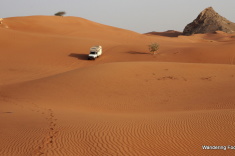For almost nine weeks, Bruno and I didn’t travel, didn’t do tourism, didn’t wander from place to place. Instead of living in our house-on-wheels, we lived in a fixed-to-the-ground house.
It’s the longest we’ve stayed in one place since I worked in Uganda almost four years ago.
At the beginning of this very atypical [for us] sedentary adventure, I expressed my excitement and pleasure at being stationary. I was totally digging the comforts of a house, the domestic routine, the feeling of groundedness and community that my nomadic life lacks.
I also predicted that, eventually, the novelty of the mundane would wear off, and that I would be ready to hit the road again.
I was right.
I don’t know exactly when the shift occurred – all I know is that, in time, I found myself daydreaming about being in Totoyaya and getting excited again about foreign places in books and on TV. At the same time, I noted that my gratitude for basic household comforts (like hot water and a washing machine) was diminishing, and that my once-mindful appreciation for my daily routine was being dogged by everyday frustrations and problems.
The novelty of living a normal life in a normal house was wearing off, and I was able to see what this type of life would be like for me without my rose-tinted glasses on.
.jpg)
Having lunch with Bruno and his parents – one of our post-yoga routines that never got old.
.jpg)
Hosting family was an amazing way to strengthen our community in France.

Extended lunches with extended family.
There are definite advantages to living in one place for an extended period of time. The one that jumps out at me the most is the ability to create roots. When you’re in one place, you become part of a community, you gain a deeper grasp of a place, its people, and its place in time and space, and you carve out a place for yourself within in. Maybe you join a club or activity that adds meaning to your life, maybe you turn a house into a home, maybe you create deep connections with people that aren’t possible when you’re flitting from place to place.
But there are also challenges to living in the real world. During my nine weeks in France, I identified a few of them:
The Perpetual To-do List
Being in the real world involves a whole lot of work and responsibility. I had to re-create a daily to-do list, something I’d happily given up four years ago when I embarked on this nomadic life with Bruno. In France, as soon as I accomplished something (and get the satisfaction of checking something off my list!) two new tasks would emerge. My to-do list seemed eternal.
What’s more, if I chose to make time for myself (to do yoga, to walk the beach, to play in the kitchen, to read), a part of me would feel guilty for taking time off. Not only did I know, in the back of my mind, that I had so much work to do (which was stressful enough), but I was often hyper-aware that even though I had chosen to take some time for myself, Bruno had chosen not to (he consistently ran around like a chicken with his head chopped off).
Trust me, there is a lot less satisfaction in sitting outside in a lounge chair with a book when your partner is spray-washing the mobile home siding (and it’s not because he’s disturbing the peace).
Ultimately, I had so little free time that I really appreciated it when I did find some. But I think I’d rather just have more free time. Being able to nurture passions, hobbies, and interests adds so much satisfaction to my life that it is challenging to accept a life without the luxury of free time.

I couldn’t help but feel guilty for doing this…

… and this.

Especially when Bruno was doing this.
The Expense
A question Bruno and I often get is how we afford to live this life of travel and adventure (I respond directly to this question here). What I can say is that, every time Bruno and I spend time in our house in France, our expenses double.
Yes, you read that right – our costs are twice as much living in a house in France than traveling around the world in our camper van. I truly don’t know how this is because we have very little to show for our expenses. But somehow, between food and entertaining and house repairs, our money just disappears.
I’m proud of our budget lifestyle in our camper van, as our low-consumerism and ability to find free fun definitely aligns with my personal values. Perhaps more importantly, though, when we spend money in our camper, I know what it’s going to – experiences that we will remember for a lifetime. Things like boating on the Arabian fjords in Oman, renting a luxury villa for a huge family reunion in Morocco, fine dining in Italy, and visiting rock-hewn churches in Ethiopia are all concrete – and therefore worthwhile, (to me) – ways in which we spent our money. It’s frustrating for me to spend twice as much money living in a house without anything tangible to show for it.
The Relationship Challenges
After not living in a real house – with real responsibilities – for almost 18 years, it’s understandable that the pace of life made Bruno a tad stressed throughout our time in France. Bruno’s work ethic is absolutely astounding, but because of the perpetual to-do list, I felt like Bruno suffered from low-grade anxiety for almost three months (and probably a month or so leading up to our decision to return to France).
I’m not ashamed to say that our relationship suffered during our three months in France. It’s pretty understandable. I mean, normally Bruno and I are together 24/7 experiencing eye-and-heart opening places and experiences together in a fairly stress-free way. In France, we had very little time together at all, and the vast majority of that was either accomplishing tasks or falling onto the sofa at night to watch TV.

Bruno and I hanging out. This is what quality time looks like for us right now! 🙂

There’s not a single picture of Bruno and I during our entire time in France until we left the south and visited the new babies in the family.

I had to merge two photos together to get shots of the two of us!
Sure, we had a bit of social time to enjoy together. And we could connect during mealtimes. But during a lot of these moments, we were distracted – by other people, by fatigue, by stress. It was emotionally unfulfilling to be sharing a life and a house with a partner without the depth of connection I have become accustomed to with him.
The Speed of Passing Time
For nine weeks, my Canadian butt lived in a house on the Mediterranean coast of France, and besides my local produce market and nearby commercial center, I saw none of it. I am almost ashamed to admit that, despite all our best intentions, Bruno and I did absolutely no touristic exploration whatsoever.
I know I talked in a recent blog about how building a community took priority over being a tourist in France, but truth be told, I intended to achieve both. The problem was that our motto became typical of non-nomadic people everywhere: Tomorrow, tomorrow.
When you have a to-do list, a routine, and responsibilities, it’s so easy to put-off doing special things like visiting a new town, historical site, or natural space. Bruno and I fully intended to visit at least a few of the many worthy sites in our area, but we always put them off. We thought we’d have time tomorrow, knew these places would still be there tomorrow.
Well, enough tomorrows went by, and suddenly, nine weeks had come and gone and I was on a flight to Canada. Though I’m satisfied I prioritized domesticity and community over tourism (in order to balance out what I get the rest of the year), I’m kicking myself just a little bit for letting time totally pass me by without taking advantage of exploring my temporary – and very interesting and beautiful– surroundings.

My most beautiful touristy shot of France in 9 weeks.

In France, I did more of this.

And this. I’m ok with that.

But it woulda been fun to do this too.
I’m definitely not saying that living in a home sucks. I’m in no way criticizing the majority of you who have chosen a non-nomadic, domestic existence for yourselves. I’m sure that many of you have found ways to get past these real-world challenges, to find solutions or tactics that help you manage them, or to balance them with the advantages of non-nomadic life. (Maybe you don’t even find them challenges at all!)
I’m just saying that, because I don’t regularly live the non-nomadic life, it’s been easy (and interesting) for me to compare it to my nomadic life, to observe the differences, and to note the advantages and drawbacks to each (I talk more directly about the plusses and minuses of living in a camper van here). At the very least, these notes can be sociologically interesting, but at the most they could also provide perspective for those of you so immersed in the real world that you don’t even realize the challenges it entails.
I already knew that occasionally dabbling with a domestic, non-nomadic life is valuable to me because it allows me to tap into the exact opposites of the life I normally lead – community, roots, routine, comfort. What I didn’t realize was that stepping into the real world would renew my energy and appreciation for my life on the road. After my refresher course on the challenges of regular life, I am refilled with gratitude for the fortune I have to live my amazing nomadic life. Thank you Universe!



Elizabeth - Guess a little dose of the ‘real’ world goes a long way. It’s clear that your usual lifestyle suits you very well as long as you have a vacation from it from time to time. Interesting perspective!
Brittany - Yes, it would seem that I love my regular lifestyle MOST of all, even if I don’t love it always. It’s nice to experience a change of pace, just as long as it’s not too long! 🙂